Report: Support Work in Social Care - Roles and Responsibilities
VerifiedAdded on 2020/07/22
|8
|1399
|38
Report
AI Summary
This report delves into the critical aspects of support work within social care environments. It outlines the roles and responsibilities of non-direct care workers, emphasizing the importance of interpersonal skills, including verbal and non-verbal communication, and the application of values. The report further explores team operations, highlighting the roles of managers and healthcare workers, communication strategies, and the purpose of team working. A significant portion is dedicated to maintaining health, safety, and security within care settings, addressing potential hazards, medication management, and security protocols. Finally, the report underscores the importance of supervision and management in the development of non-direct care workers, discussing the purpose, process, and value of effective supervision to ensure quality care and support for individuals in need. The report uses references to support the discussion.
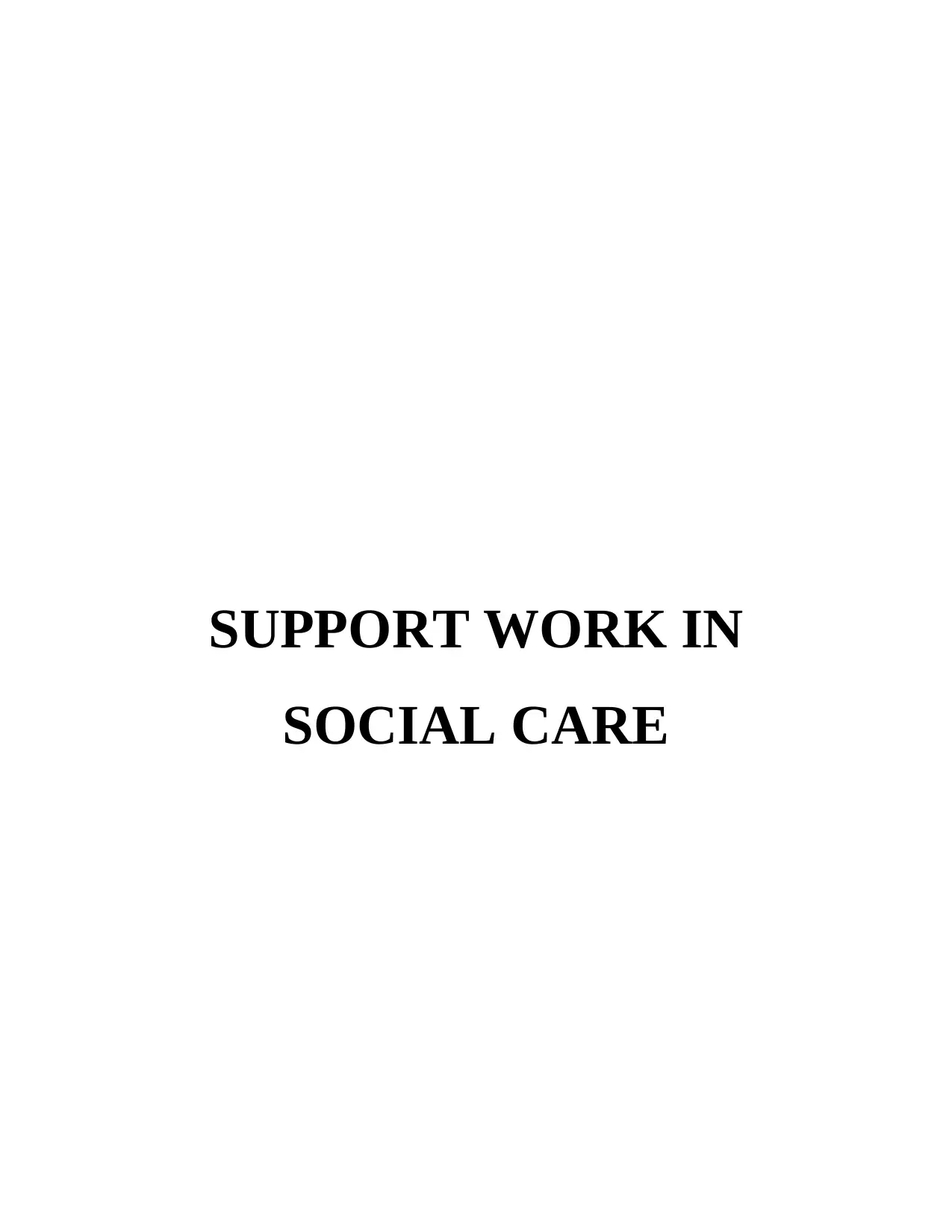
SUPPORT WORK IN
SOCIAL CARE
SOCIAL CARE
Paraphrase This Document
Need a fresh take? Get an instant paraphrase of this document with our AI Paraphraser
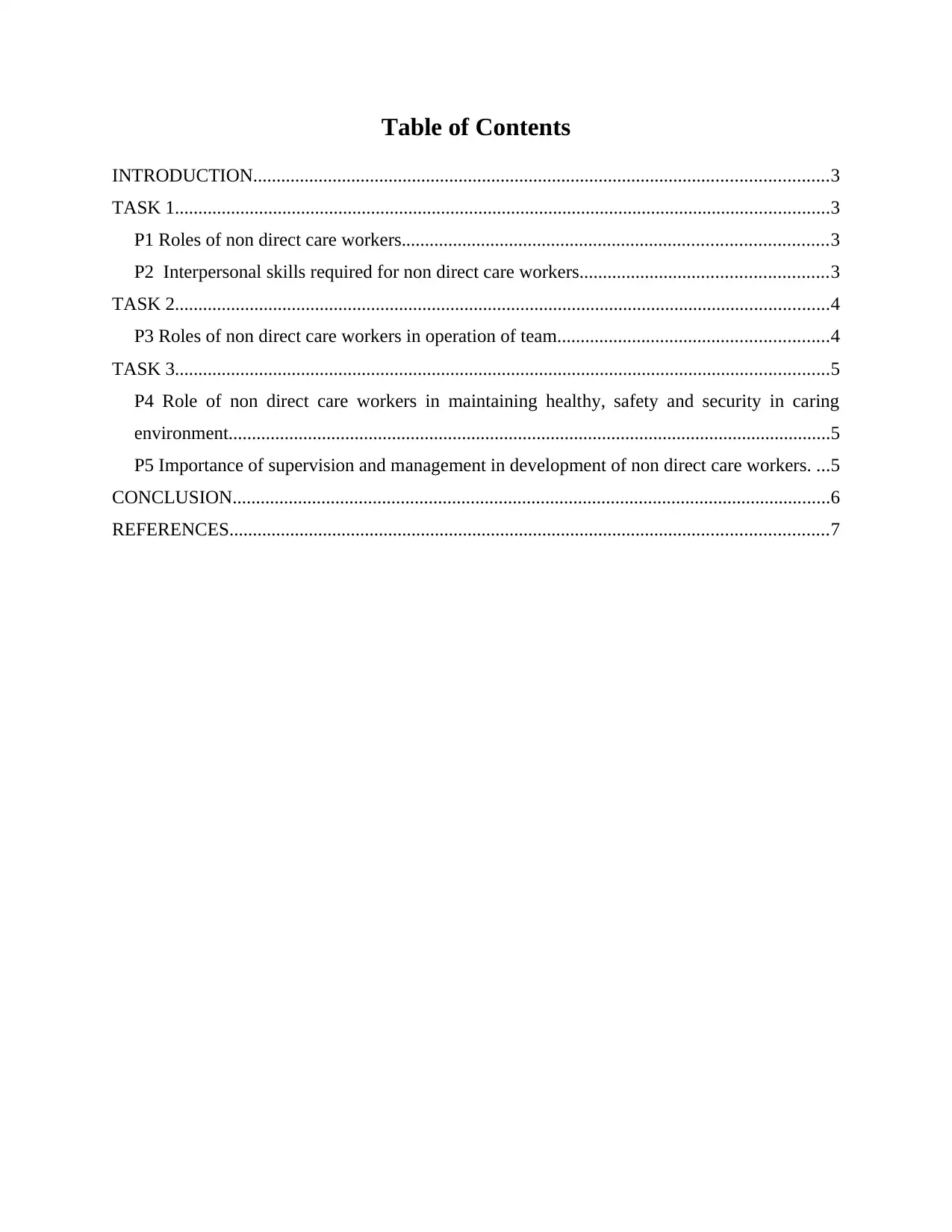
Table of Contents
INTRODUCTION...........................................................................................................................3
TASK 1............................................................................................................................................3
P1 Roles of non direct care workers...........................................................................................3
P2 Interpersonal skills required for non direct care workers.....................................................3
TASK 2............................................................................................................................................4
P3 Roles of non direct care workers in operation of team..........................................................4
TASK 3............................................................................................................................................5
P4 Role of non direct care workers in maintaining healthy, safety and security in caring
environment.................................................................................................................................5
P5 Importance of supervision and management in development of non direct care workers. ...5
CONCLUSION................................................................................................................................6
REFERENCES................................................................................................................................7
INTRODUCTION...........................................................................................................................3
TASK 1............................................................................................................................................3
P1 Roles of non direct care workers...........................................................................................3
P2 Interpersonal skills required for non direct care workers.....................................................3
TASK 2............................................................................................................................................4
P3 Roles of non direct care workers in operation of team..........................................................4
TASK 3............................................................................................................................................5
P4 Role of non direct care workers in maintaining healthy, safety and security in caring
environment.................................................................................................................................5
P5 Importance of supervision and management in development of non direct care workers. ...5
CONCLUSION................................................................................................................................6
REFERENCES................................................................................................................................7
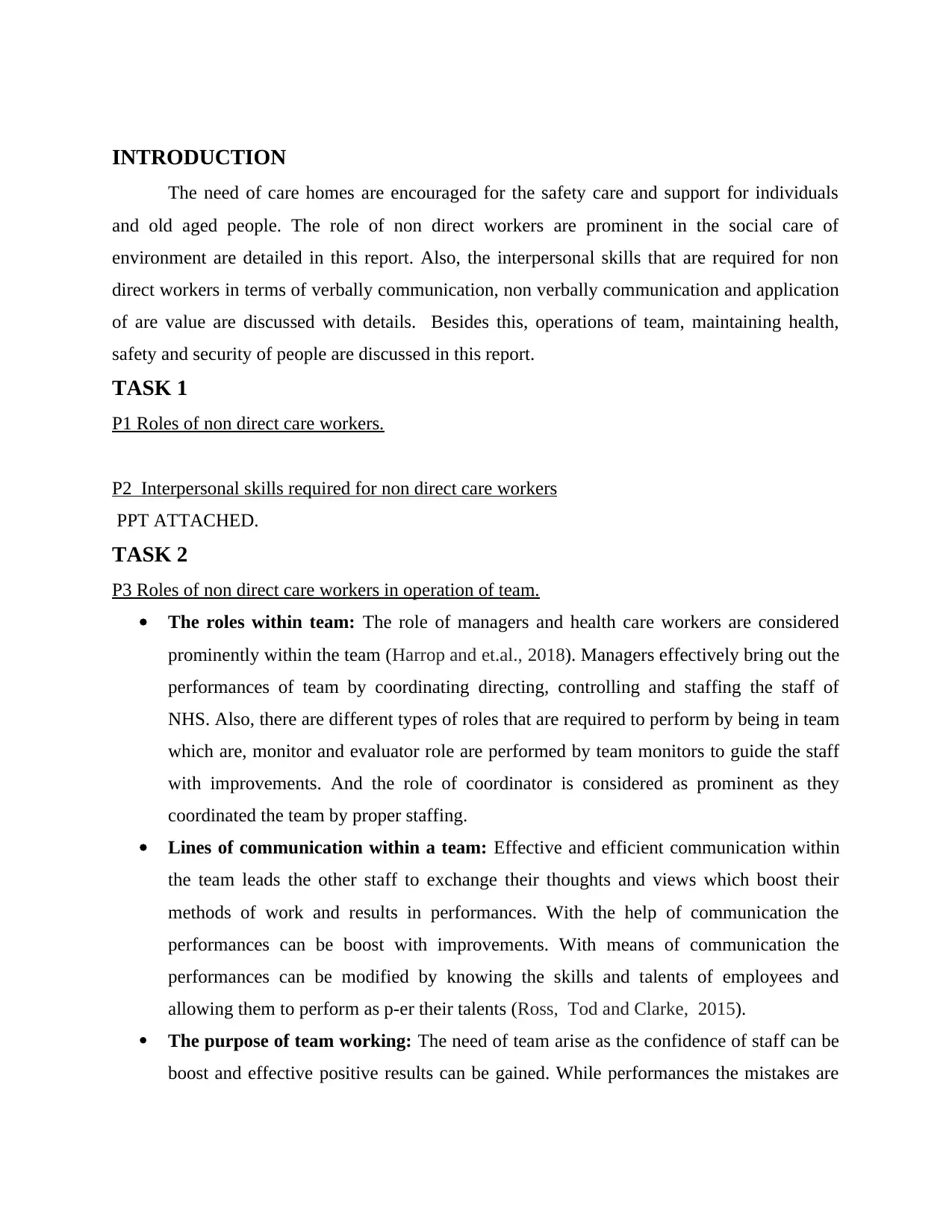
INTRODUCTION
The need of care homes are encouraged for the safety care and support for individuals
and old aged people. The role of non direct workers are prominent in the social care of
environment are detailed in this report. Also, the interpersonal skills that are required for non
direct workers in terms of verbally communication, non verbally communication and application
of are value are discussed with details. Besides this, operations of team, maintaining health,
safety and security of people are discussed in this report.
TASK 1
P1 Roles of non direct care workers.
P2 Interpersonal skills required for non direct care workers
PPT ATTACHED.
TASK 2
P3 Roles of non direct care workers in operation of team.
The roles within team: The role of managers and health care workers are considered
prominently within the team (Harrop and et.al., 2018). Managers effectively bring out the
performances of team by coordinating directing, controlling and staffing the staff of
NHS. Also, there are different types of roles that are required to perform by being in team
which are, monitor and evaluator role are performed by team monitors to guide the staff
with improvements. And the role of coordinator is considered as prominent as they
coordinated the team by proper staffing.
Lines of communication within a team: Effective and efficient communication within
the team leads the other staff to exchange their thoughts and views which boost their
methods of work and results in performances. With the help of communication the
performances can be boost with improvements. With means of communication the
performances can be modified by knowing the skills and talents of employees and
allowing them to perform as p-er their talents (Ross, Tod and Clarke, 2015).
The purpose of team working: The need of team arise as the confidence of staff can be
boost and effective positive results can be gained. While performances the mistakes are
The need of care homes are encouraged for the safety care and support for individuals
and old aged people. The role of non direct workers are prominent in the social care of
environment are detailed in this report. Also, the interpersonal skills that are required for non
direct workers in terms of verbally communication, non verbally communication and application
of are value are discussed with details. Besides this, operations of team, maintaining health,
safety and security of people are discussed in this report.
TASK 1
P1 Roles of non direct care workers.
P2 Interpersonal skills required for non direct care workers
PPT ATTACHED.
TASK 2
P3 Roles of non direct care workers in operation of team.
The roles within team: The role of managers and health care workers are considered
prominently within the team (Harrop and et.al., 2018). Managers effectively bring out the
performances of team by coordinating directing, controlling and staffing the staff of
NHS. Also, there are different types of roles that are required to perform by being in team
which are, monitor and evaluator role are performed by team monitors to guide the staff
with improvements. And the role of coordinator is considered as prominent as they
coordinated the team by proper staffing.
Lines of communication within a team: Effective and efficient communication within
the team leads the other staff to exchange their thoughts and views which boost their
methods of work and results in performances. With the help of communication the
performances can be boost with improvements. With means of communication the
performances can be modified by knowing the skills and talents of employees and
allowing them to perform as p-er their talents (Ross, Tod and Clarke, 2015).
The purpose of team working: The need of team arise as the confidence of staff can be
boost and effective positive results can be gained. While performances the mistakes are
⊘ This is a preview!⊘
Do you want full access?
Subscribe today to unlock all pages.

Trusted by 1+ million students worldwide
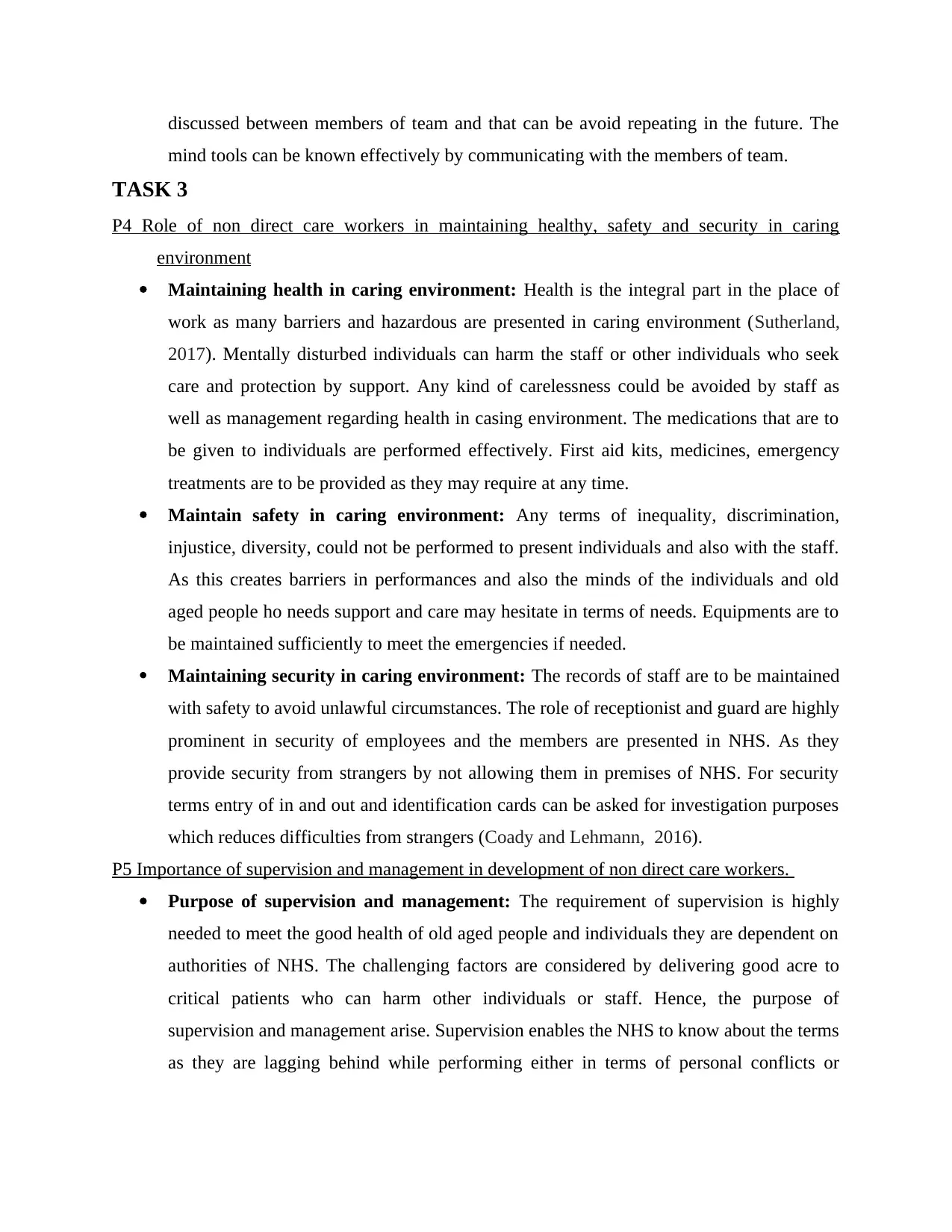
discussed between members of team and that can be avoid repeating in the future. The
mind tools can be known effectively by communicating with the members of team.
TASK 3
P4 Role of non direct care workers in maintaining healthy, safety and security in caring
environment
Maintaining health in caring environment: Health is the integral part in the place of
work as many barriers and hazardous are presented in caring environment (Sutherland,
2017). Mentally disturbed individuals can harm the staff or other individuals who seek
care and protection by support. Any kind of carelessness could be avoided by staff as
well as management regarding health in casing environment. The medications that are to
be given to individuals are performed effectively. First aid kits, medicines, emergency
treatments are to be provided as they may require at any time.
Maintain safety in caring environment: Any terms of inequality, discrimination,
injustice, diversity, could not be performed to present individuals and also with the staff.
As this creates barriers in performances and also the minds of the individuals and old
aged people ho needs support and care may hesitate in terms of needs. Equipments are to
be maintained sufficiently to meet the emergencies if needed.
Maintaining security in caring environment: The records of staff are to be maintained
with safety to avoid unlawful circumstances. The role of receptionist and guard are highly
prominent in security of employees and the members are presented in NHS. As they
provide security from strangers by not allowing them in premises of NHS. For security
terms entry of in and out and identification cards can be asked for investigation purposes
which reduces difficulties from strangers (Coady and Lehmann, 2016).
P5 Importance of supervision and management in development of non direct care workers.
Purpose of supervision and management: The requirement of supervision is highly
needed to meet the good health of old aged people and individuals they are dependent on
authorities of NHS. The challenging factors are considered by delivering good acre to
critical patients who can harm other individuals or staff. Hence, the purpose of
supervision and management arise. Supervision enables the NHS to know about the terms
as they are lagging behind while performing either in terms of personal conflicts or
mind tools can be known effectively by communicating with the members of team.
TASK 3
P4 Role of non direct care workers in maintaining healthy, safety and security in caring
environment
Maintaining health in caring environment: Health is the integral part in the place of
work as many barriers and hazardous are presented in caring environment (Sutherland,
2017). Mentally disturbed individuals can harm the staff or other individuals who seek
care and protection by support. Any kind of carelessness could be avoided by staff as
well as management regarding health in casing environment. The medications that are to
be given to individuals are performed effectively. First aid kits, medicines, emergency
treatments are to be provided as they may require at any time.
Maintain safety in caring environment: Any terms of inequality, discrimination,
injustice, diversity, could not be performed to present individuals and also with the staff.
As this creates barriers in performances and also the minds of the individuals and old
aged people ho needs support and care may hesitate in terms of needs. Equipments are to
be maintained sufficiently to meet the emergencies if needed.
Maintaining security in caring environment: The records of staff are to be maintained
with safety to avoid unlawful circumstances. The role of receptionist and guard are highly
prominent in security of employees and the members are presented in NHS. As they
provide security from strangers by not allowing them in premises of NHS. For security
terms entry of in and out and identification cards can be asked for investigation purposes
which reduces difficulties from strangers (Coady and Lehmann, 2016).
P5 Importance of supervision and management in development of non direct care workers.
Purpose of supervision and management: The requirement of supervision is highly
needed to meet the good health of old aged people and individuals they are dependent on
authorities of NHS. The challenging factors are considered by delivering good acre to
critical patients who can harm other individuals or staff. Hence, the purpose of
supervision and management arise. Supervision enables the NHS to know about the terms
as they are lagging behind while performing either in terms of personal conflicts or
Paraphrase This Document
Need a fresh take? Get an instant paraphrase of this document with our AI Paraphraser
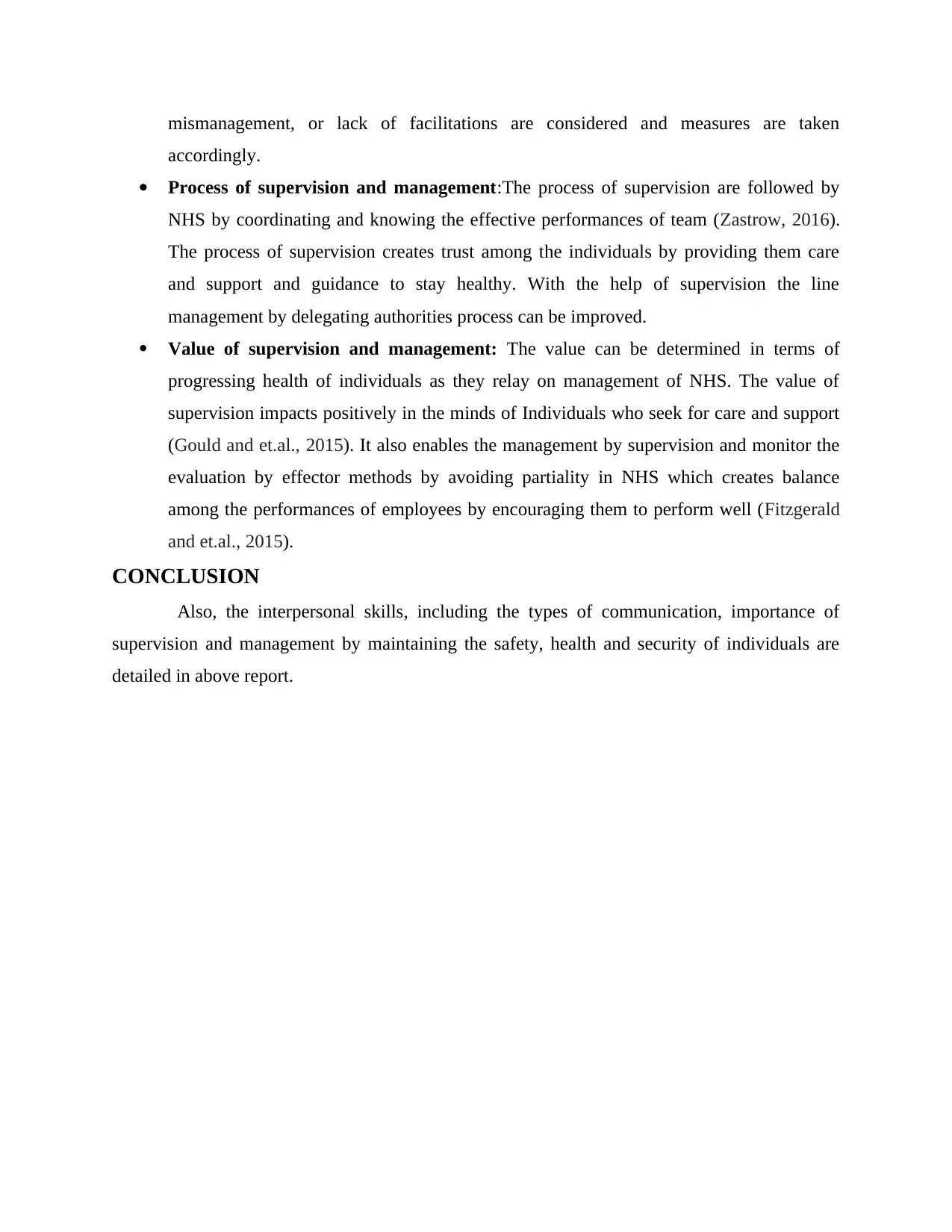
mismanagement, or lack of facilitations are considered and measures are taken
accordingly.
Process of supervision and management:The process of supervision are followed by
NHS by coordinating and knowing the effective performances of team (Zastrow, 2016).
The process of supervision creates trust among the individuals by providing them care
and support and guidance to stay healthy. With the help of supervision the line
management by delegating authorities process can be improved.
Value of supervision and management: The value can be determined in terms of
progressing health of individuals as they relay on management of NHS. The value of
supervision impacts positively in the minds of Individuals who seek for care and support
(Gould and et.al., 2015). It also enables the management by supervision and monitor the
evaluation by effector methods by avoiding partiality in NHS which creates balance
among the performances of employees by encouraging them to perform well (Fitzgerald
and et.al., 2015).
CONCLUSION
Also, the interpersonal skills, including the types of communication, importance of
supervision and management by maintaining the safety, health and security of individuals are
detailed in above report.
accordingly.
Process of supervision and management:The process of supervision are followed by
NHS by coordinating and knowing the effective performances of team (Zastrow, 2016).
The process of supervision creates trust among the individuals by providing them care
and support and guidance to stay healthy. With the help of supervision the line
management by delegating authorities process can be improved.
Value of supervision and management: The value can be determined in terms of
progressing health of individuals as they relay on management of NHS. The value of
supervision impacts positively in the minds of Individuals who seek for care and support
(Gould and et.al., 2015). It also enables the management by supervision and monitor the
evaluation by effector methods by avoiding partiality in NHS which creates balance
among the performances of employees by encouraging them to perform well (Fitzgerald
and et.al., 2015).
CONCLUSION
Also, the interpersonal skills, including the types of communication, importance of
supervision and management by maintaining the safety, health and security of individuals are
detailed in above report.
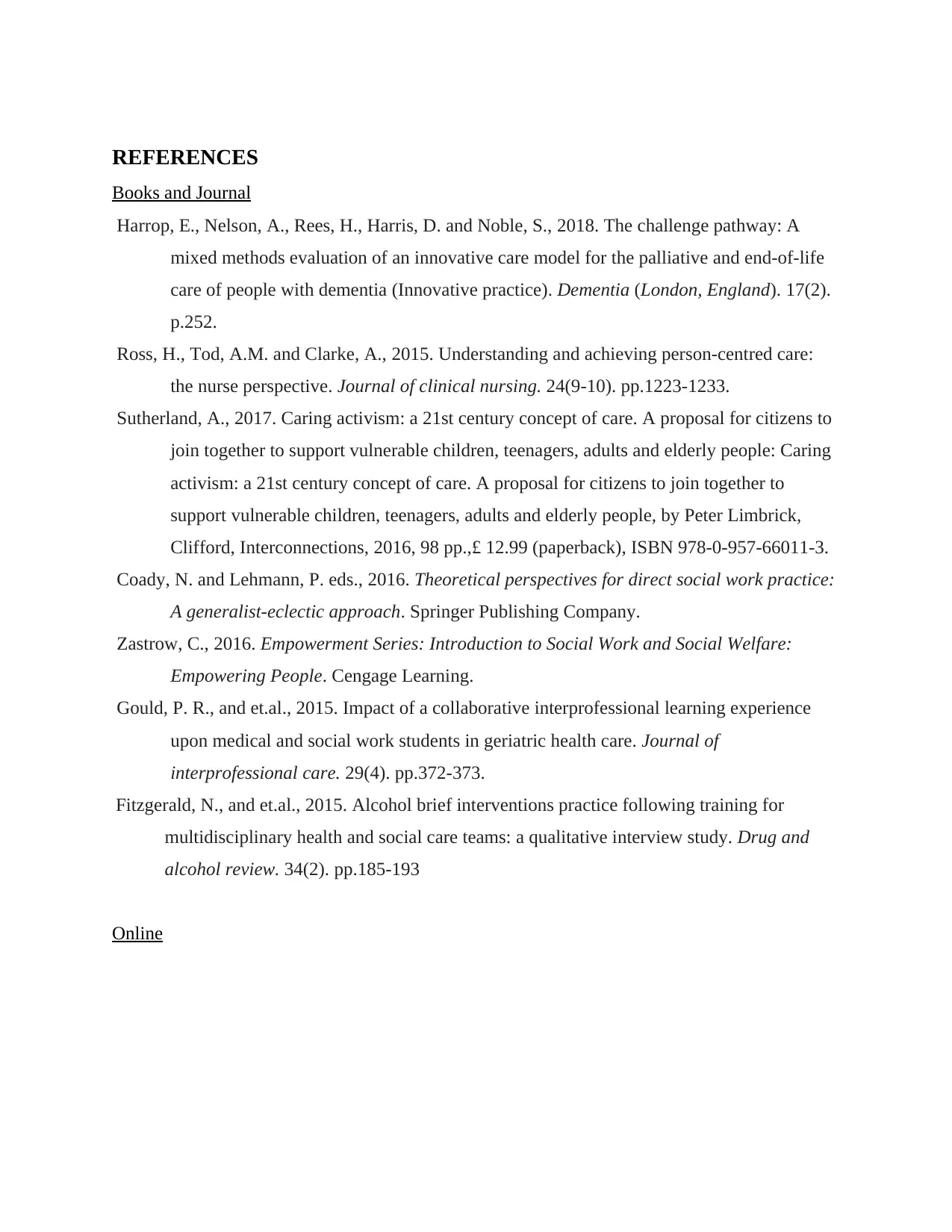
REFERENCES
Books and Journal
Harrop, E., Nelson, A., Rees, H., Harris, D. and Noble, S., 2018. The challenge pathway: A
mixed methods evaluation of an innovative care model for the palliative and end-of-life
care of people with dementia (Innovative practice). Dementia (London, England). 17(2).
p.252.
Ross, H., Tod, A.M. and Clarke, A., 2015. Understanding and achieving person‐centred care:
the nurse perspective. Journal of clinical nursing. 24(9-10). pp.1223-1233.
Sutherland, A., 2017. Caring activism: a 21st century concept of care. A proposal for citizens to
join together to support vulnerable children, teenagers, adults and elderly people: Caring
activism: a 21st century concept of care. A proposal for citizens to join together to
support vulnerable children, teenagers, adults and elderly people, by Peter Limbrick,
Clifford, Interconnections, 2016, 98 pp.,£ 12.99 (paperback), ISBN 978-0-957-66011-3.
Coady, N. and Lehmann, P. eds., 2016. Theoretical perspectives for direct social work practice:
A generalist-eclectic approach. Springer Publishing Company.
Zastrow, C., 2016. Empowerment Series: Introduction to Social Work and Social Welfare:
Empowering People. Cengage Learning.
Gould, P. R., and et.al., 2015. Impact of a collaborative interprofessional learning experience
upon medical and social work students in geriatric health care. Journal of
interprofessional care. 29(4). pp.372-373.
Fitzgerald, N., and et.al., 2015. Alcohol brief interventions practice following training for
multidisciplinary health and social care teams: a qualitative interview study. Drug and
alcohol review. 34(2). pp.185-193
Online
Books and Journal
Harrop, E., Nelson, A., Rees, H., Harris, D. and Noble, S., 2018. The challenge pathway: A
mixed methods evaluation of an innovative care model for the palliative and end-of-life
care of people with dementia (Innovative practice). Dementia (London, England). 17(2).
p.252.
Ross, H., Tod, A.M. and Clarke, A., 2015. Understanding and achieving person‐centred care:
the nurse perspective. Journal of clinical nursing. 24(9-10). pp.1223-1233.
Sutherland, A., 2017. Caring activism: a 21st century concept of care. A proposal for citizens to
join together to support vulnerable children, teenagers, adults and elderly people: Caring
activism: a 21st century concept of care. A proposal for citizens to join together to
support vulnerable children, teenagers, adults and elderly people, by Peter Limbrick,
Clifford, Interconnections, 2016, 98 pp.,£ 12.99 (paperback), ISBN 978-0-957-66011-3.
Coady, N. and Lehmann, P. eds., 2016. Theoretical perspectives for direct social work practice:
A generalist-eclectic approach. Springer Publishing Company.
Zastrow, C., 2016. Empowerment Series: Introduction to Social Work and Social Welfare:
Empowering People. Cengage Learning.
Gould, P. R., and et.al., 2015. Impact of a collaborative interprofessional learning experience
upon medical and social work students in geriatric health care. Journal of
interprofessional care. 29(4). pp.372-373.
Fitzgerald, N., and et.al., 2015. Alcohol brief interventions practice following training for
multidisciplinary health and social care teams: a qualitative interview study. Drug and
alcohol review. 34(2). pp.185-193
Online
⊘ This is a preview!⊘
Do you want full access?
Subscribe today to unlock all pages.

Trusted by 1+ million students worldwide

Know roles which are involved in non-direct care in social care environments 2010. [Online]
Available through <http://quals.onefile.co.uk/pdf/unit/NHC_042.pdf>
Available through <http://quals.onefile.co.uk/pdf/unit/NHC_042.pdf>
Paraphrase This Document
Need a fresh take? Get an instant paraphrase of this document with our AI Paraphraser

1
1 out of 8
Related Documents
Your All-in-One AI-Powered Toolkit for Academic Success.
+13062052269
info@desklib.com
Available 24*7 on WhatsApp / Email
![[object Object]](/_next/static/media/star-bottom.7253800d.svg)
Unlock your academic potential
Copyright © 2020–2026 A2Z Services. All Rights Reserved. Developed and managed by ZUCOL.





